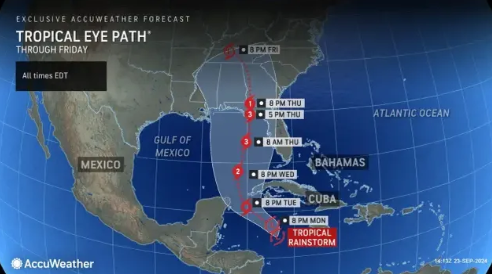Hurricane Helene was a threat to the eastern United States, including Florida, Georgia, South Carolina and North Carolina, “dumping lots of rain on the city of Charlotte,” according to the National Weather Service. Western Florida and Western North Carolina received dangerous amounts of rain and wind through a Category 3 hurricane which brought up to 125 MPH of wind. The destruction was devastating to the residents of the area. Some people evacuated to stay safe, but some weren’t too aware of how severely the hurricane would impact them and stayed.
In Charlotte, NC, rains started Thursday night and did not end until Friday noon, which canceled schools in our county and ones nearby. As of Tuesday evening, the hurricane was near Cancún, Mexico. On Thursday, it made landfall in Florida, and Friday early morning, it hit Western North Carolina and Eastern Tennessee. The hurricane’s aftereffects, such as tornadoes, could’ve been much worse, but flooded cities in Florida, North Carolina and Tennessee are struggling to recover. I-40 near the NC and TN border is closed until September 2025, and I-26 near the NC and TN border is closed TBD.
If you’re worried about future potential hurricanes and power outages, make sure to prepare. You will need enough bottled water for days or weeks and a first-aid kit if anything goes terribly wrong. Follow potential warnings and government announcements if evacuation is needed or recommended. Try not to drive or travel during the day(s) of the hurricane as the slippery roads and high speed winds can be a hazard not only to you but other drivers as well. You may also want to stock-up on non-perishable food in case your gas supply cuts out and you can’t make food.
Thankfully, Hurricane Helene wasn’t too dangerous in our area, but areas just a few hours away are still suffering from the impact. Try to help them out through volunteering, and stay safe for the future.








